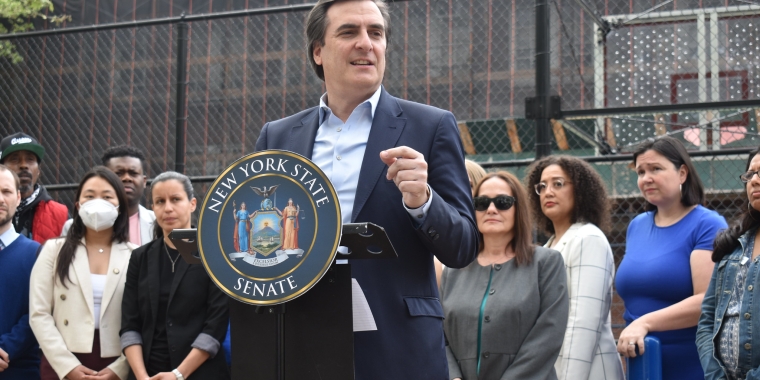
Gotham Gazette: 'State Government is More Important Than It's Ever Been': Senator Gianaris on Upheaval at New York's Top Court, Redistricting, Bail Reform, & More

New York State Senate Deputy Leader Michael Gianaris has been a key figure in the Democratic takeover of the State Senate, and thus all of state government as of 2019, and in negotiating budget and legislative decisions on a wide variety of issues. That has included state action to counteract recent decisions by the U.S. Supreme Court on abortion rights and New York’s gun laws.
Gianaris, a Queens Democrat who represents the 12th State Senate District, has also been taking on New York’s highest court, the Court of Appeals, and expressing contrition over his support for appointments to the court who formed a conservative majority that undid the legislative redistricting performed by the Legislature, among other controversial decisions.
“It has become a court, thanks to the four members that have stuck together in this majority bloc that we've had of late, that has been ruling in favor of the most powerful against the interests of those who need government on their side,” said Gianaris, in a recent interview on Gotham Gazette’s Max Politics podcast. “What we don’t want is to have our own version of the U.S. Supreme Court here in New York where you have this majority bloc driving legal interpretations in the wrong direction.”
During the interview with host Ben Max, Gianaris spoke about the New York Court of Appeals, the 2022 redistricting controversy, bail reform, gun control, and more. He also discussed legislation that he hopes to pass next session and that he passed recently and wants Governor Kathy Hochul to sign, as well as the upcoming State Senate elections, which will see primaries in August and the general election in the fall and wherein his party is hoping to keep its current super-majority but will have some challenging seats to hold.
The New York Court of Appeals has come under scrutiny for its conservative-leaning majority, perceived by many New Yorkers as unrepresentative of the people in a heavily Democratic state. With the four-judge bloc mentioned by Gianaris, the Court has stood in opposition to the Democratic leadership of both houses of the Legislature, including the State Senate where its justices were confirmed.
With the interview came on the heels of major Court of Appeals decisions and the announcement July 11 by Chief Judge Janet DiFiore that she will retire at the end of August, Gianaris had much to say about the court’s past and future.
Hochul will nominate a successor to DiFiore, who will be considered by Gianaris and his colleagues in the Senate. Some of the members of the current court were confirmed before the Democrats took the majority in the State Senate, but several since.
Gianaris said he was not “particularly proud” of his decision to strongly support the nomination of Madeline Singas, who has been part of the “majority bloc” he spoke of, but sees DiFiore’s resignation as a chance for redemption and to reimagine the court, which ruled earlier this year to strike down the maps drawn by the Legislature and appoint a “special master” to draw new State Senate and U.S. House of Representatives districts, a decision Gianaris has been highly critical of.
"I do regret supporting the nomination,” Gianaris said of Singas, who he had thrown his significant political weight behind despite a push from some progressives to oppose her when then-Governor Andrew Cuomo put the then-Nassau County District Attorney’s name forth. “I think it was a mistake."
“The Court has drifted to a place that is not really representing the values of our state,” he said on the podcast. “With the DiFiore resignation, now we have a great opportunity to learn from that experience and take things back in the direction they should go.”
Gianaris said the timeline for the appointment of a new judge is uncertain, and could take up to several months given the process that will unfold. Whoever Hochul nominates to the Court of Appeals does not necessarily have to be the new chief judge, that role could be filled by a current justice on the court. Gianaris pledged that the Senate would do its due diligence and perhaps take a more assertive role than in the past.
Perhaps most frustrating for Gianaris and many other Democrats was the Court of Appeals’ decision in the redistricting case earlier this year, where it ruled that the Legislature had not followed the constitutional process for redrawing state legislative and congressional districts after the Census.
The state’s independent bipartisan redistricting commission, a body of five Democrats and five Republicans established by a 2014 state constitutional amendment approved by voters, was tasked with creating the new districts but gridlocked.
The Democrat-dominated Legislature then drew the maps, as was its right under the law, but because the commission had never passed a set of maps it was supposed to pass, the eventual Republican challenge to the Legislature’s maps was upheld, and instead of the Court of Appeals sending the process back to the commission then the Legislature, it simply appointed a special master.
“If the decision was simply the lines for Congress were drawn in an impermissibly partisan fashion, the remedy according to the constitution is send it back to the Legislature with direction to do it differently,” Gianaris told Max. “That didn’t get to happen because the Court just took it out of the Legislature’s hands entirely. It was a partisan attack by the Court of Appeals. It’s unfortunate, but we’re living with the consequences of it and move forward.”
A self-described advocate for “a fair and true process,” Gianaris said the redistricting amendment should be revisited, and called for a new system designed to prevent deadlock. He said there is now time to reconsider the process and plan a path ahead before the next Census, in 2030, and redistricting thereafter.
The new district lines have caused a significant amount of upheaval and change, including Gianaris’ own district, which has lost some of its more progressive western Queens territory.
That area, including a chunk of Astoria, is part of a new tri-borough 59th State Senate District, spanning the Queens waterfront, areas of Brooklyn and some of Manhattan’s East Side. A competitive Democratic primary has emerged for the open seat and Gianaris has endorsed Kristen Gonzalez, a Queens native and democratic socialist.
As for his own district, now at least somewhat more moderate than before, Gianaris said the new map will not affect his politics as he looks forward to getting to better know the residents of his district and their communities.
“The job of an elected official in my view is to give the power to those people who don’t otherwise have it,” he said. “Those are the people that I try to stand up for and use the power that I have to advance their interests. That’s always been the case no matter what my district has looked like.”
He added that he believes in taking what he believes are the right positions on policies and then letting his constituents judge whether he made the right decisions as their representative.
As for other notable primaries happening this summer, Gianaris said the Senate Democratic campaign committee that he leads has a different policy from its Assembly counterpart and that it does not get involved in primaries, whereas the Assembly largely backs incumbents. When asked by Max about two races of interest, Gianaris said he is personally endorsing State Senator Gustavo Rivera of the Bronx, who is facing a tough primary challenge, and that he has not yet taken a close look at the race in Brooklyn where State Senator Kevin Parker is facing a left-wing challenger.
As for the fall general election, while he didn’t cite any specific races, Gianaris said he is focused on districts in Long Island, the Hudson Valley, and upstate cities as those are typically the battle grounds for swing State Senate seats and the outcomes of those races will determine the size of the Democratic majority come next year (even Republicans acknowledge they have little change to flip enough seats this cycle to return to the majority).
On the policy front, Gianaris was asked about legislation that has flown under the radar that he is either particularly happy about having passed or looking forward to pursuing passage of in the future. Gianaris cited three legislative initiatives – an antitrust bill, a ban on the retail sale of animals, and anti-corruption and oversight laws – that he has championed. Gianaris said the antitrust bill would change the way powerful corporations are held accountable and reigned in, and he will continue to seek its approval in the Legislature next session. He urged Governor Hochul to sign his bill that passed this session to outlaw the sale of dogs, cats, and several other animals in pet stores.
Max also asked Gianaris about the changes to the state’s bail laws that he and his colleagues made in the April budget deal that for the second time toughen some of the sweeping reforms made in 2019, a major compromise that Gianaris had helped negotiate as a longtime champion of bail reform.
That 2019 law largely eliminated bail and pre-trial detention for misdemeanor and non-violent offenses. Amid a wave of criticism (but before the law had been fully implemented and evaluated), Cuomo and Democratic legislators agreed to make some tweaks in 2020, adding certain offenses to the bail-eligible list, and this year Hochul and legislators made more significant changes focused on repeat offenders.
Gianaris said he has never dealt with an issue that has been so “misrepresented” as has been the case with bail reform, and argued that having the financial means to pay bail should not determine one’s freedom.
“To try and remove the influence of money and means from the question of whether someone is free while they’re awaiting their day in court is one that we should all be able to agree on,” he said. “The overall issue of whether we should require people to pay for their freedom before they’re convicted of a crime is…pretty clear where justice lies.”
"There's situations like the changes we just made, and we're always trying to learn and improve, where someone who is repeat offending over and over and over again while they're out, obviously should be treated differently and we have now taken steps to deal with that circumstance," Gianaris said of changes made in the April state budget, "but the overall issue of whether we should require people to pay for their freedom before they're convicted of a crime is, once you scratch the surface and actually learn about it, pretty clear where justice lies."
Asked to sum up if he is comfortable with the recent set of changes, he said: "We always hope so, that as we make changes that we are making progress in the broader sense of the word. Yes, I think that we are in the place now where we are ensuring that you don't get some of the unfortunate outcomes that the New York Post in particular likes to point to. But at the same time, preserving this notion that if you're being charged with a low level you should not be held in jail just because you don't have $500 to pay your way out."
“We are trying to come up with a system that is as fair as possible and provides for the safety of people but also does not deny people justice,” said Gianaris.
In response to the recent Supreme Court decision striking down New York’s century-old concealed carry gun regulation, Governor Hochul called a special session for the Legislature to pass a new law that conforms with the ruling but restricts gun ownership and concealed carry permits. The law that was passed and signed by Hochul created a robust licensing process and a significant list of “sensitive places” where guns could not be carried by most individuals -- seizing on leeway granted in the SCOTUS decision. Firearms will be prohibited in many locations including schools, parks, houses of worship, subways, Times Square, and more.
“We took great care to come up with a response that used elements that were specifically authorized in the Supreme Court’s decision,” Gianaris said when asked about whether the new law will stand up to the inevitable legal challenge.
The legislation also strengthens background checks and expands the requirement that the applicant have “good moral character” to obtain a firearm. The law calls for training courses and storage safety requirements.
“We did what was responsible to provide for the safety of New Yorkers within the confines that the Court set for us,” said Gianaris. “I think unfortunately we’re going to be in this ongoing tug of war between states and the Supreme Court, which is why state government is more important than it has ever been…We have a greater responsibility than ever to provide a response for New Yorkers.”


